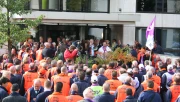Hack-a-Little (Hack-a-LOD 2020)
Geoconnectables or Mapping the Priests
connecting 8 major LOD suppliers
Strikes: collective action in times of economic progress?
The paradox
An often heard claim in the social sciences is that strikes occur most often, not during crises, but in the prosperous years after. As this is counter intuitive, it sounds like an interesting problem. One reason that might explain this phenomenon is that people only strike when they dare to. In economic prosperous times the job market has a shortage, and employees can demand more favourable conditions. Another argument is that of relative deprivation. When a more prosperous era starts, not everyone will benefit at the same time and degree. Thus people may become unhappy, when they see others already benefitting from the improved conditions and as a result they will strike for equal benefits.
To see whether these arguments makes sense, we turn to the Netherlands, in the period 1970-1985. The Netherlands was struck by two crises after which more prosperous periods followed.
The Florentine Catasto of 1427
The Catasto is a tax assessment of the inhabitants of Florence and its surrounding territories between 1427 and 1429. In the Catasto, officials listed the wealth, debts, and assets of households in the Republic of Florence. Unlike many premodern tax assessments - which only taxed the rich - the Catasto aimed to include all households within the Republic. To see if indeed all or most inhabitants of Florence are included, we can compare the Catasto with estimates of historical population figures from the Baghad to London dataset. The comparison shows that the Catasto likely underreports the inhabitants of the city of Florence, but the difference is small compared to most other premodern tax assessments – and keeping in mind that the 55k is an estimate.


